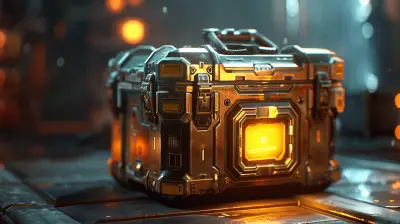Hidden Costs: How Loot Boxes Impact Game Economies
15 September 2025
If you've been gaming for a while, chances are you've come across loot boxes. They're those shiny, treasure chest-like rewards that promise a chance to snag rare items, characters, or upgrades. It’s hard to resist the allure, right? I mean, who doesn’t want the thrill of opening a box and striking gold (or something cooler than another common skin)? But have you ever stopped to think about the real price of these digital goodies? I’m not just talking about the money you spend; I’m talking about how loot boxes mess with game economies—and maybe even your wallet—behind the scenes.
Let’s dive into the nitty-gritty of how loot boxes work, what they cost beyond the numbers on your screen, and why they’re more than just harmless fun. Spoiler alert: it’s a bit more complicated than it seems.
What Are Loot Boxes, Anyway?
Before we get too deep, let’s cover the basics. Loot boxes are essentially virtual grab bags or mystery boxes. You pay (either with in-game currency or cold, hard cash) to open them and get random rewards. Think of it like a lottery: you might get something amazing, or you might end up with something you already have—or worse, something you don’t even want.Here’s the kicker: loot boxes are deliberately designed to prey on your brain’s love for dopamine. That rush you feel when you open one and see a shiny, rare item pop up? That’s your brain getting a little hit of happy chemicals. And game developers know this. They’ve turned loot boxes into addictive little money pits that keep us coming back for more.
The Psychological Hook: Why We Fall for Loot Boxes
Let’s get real for a second. Loot boxes aren’t just about chance—they’re about psychology. Developers use tactics like bright colors, flashy animations, and suspenseful “opening” sequences to keep you hooked. It’s kind of like playing a slot machine in Vegas, minus the clinking coins and free drinks.Ever heard of the sunk cost fallacy? That’s when you invest time or money into something, and even if it’s not paying off, you keep going because you’ve already put so much into it. Loot boxes leverage this hard. Bought ten loot boxes and didn’t get what you wanted? You’re more likely to buy ten more because, hey, it’s gotta be in the next one, right? Wrong. That’s the trap.
Hidden Costs for Players
1. The Financial Black Hole
Let’s not sugarcoat it: loot boxes are a cash cow for game developers, and that cash? It’s coming straight out of your pocket. What starts as “just a dollar” can spiral quickly. Small in-game purchases pile up faster than you realize. A dollar here, five bucks there, and suddenly you’re staring at a credit card bill that could’ve paid for an entirely new game—or two.What makes it worse? Many games target vulnerable players, including kids. Sure, there’s the argument that loot boxes are “optional,” but let’s be honest: in a lot of games, it barely feels like a choice.
2. Pay-to-Win Frustration
Here’s where things start getting sticky. Some games use loot boxes to sell you items that actually affect gameplay—better weapons, stronger characters, etc. This creates a pay-to-win environment where players who fork over cash have an unfair edge over those who don’t. It’s like showing up to a friendly game of basketball, only to find the other team paid for jetpacks.And for players who don’t buy loot boxes? They’re often stuck grinding for hours just to keep up, which can turn what was once a fun pastime into a frustrating chore. 
The Ripple Effect on Game Economies
Now, let’s look at the bigger picture. Loot boxes don’t just impact individual players—they also wreak havoc on the in-game economies developers create.1. Inflation and Devaluation
When loot boxes flood the market with rare items (even if they’re random), they can inadvertently mess with the game’s economy. Items that were once hard to get and valuable can suddenly become common and cheap. Ironically, this can make the rewards from loot boxes feel less special, which in turn pushes developers to crank out new loot boxes. It’s a vicious cycle.Think of it like dumping a ton of cash into the real-world economy overnight. The more money (or rare items) there is floating around, the less each individual piece is worth. That $100 bill isn’t quite as exciting when everyone else has one, too.
2. Artificial Scarcity
On the flip side, developers can also use loot boxes to create artificial scarcity. They limit the availability of certain items, knowing it’ll drive demand (and spending) through the roof. It’s like when a sneaker company drops a “limited edition” pair that everyone scrambles to buy, even if they don’t really need them. The result? FOMO (fear of missing out) kicks in, and players feel pressured to spend while they still can.The Social Costs of Loot Boxes
It’s not just your wallet or the in-game economy that takes a hit—loot boxes can also affect the gaming community as a whole. Here’s how:1. Dividing the Playerbase
Pay-to-win mechanics can create a divide between players who can afford loot boxes and those who can’t. One group gets all the cool gear and advantages, while the other is left feeling like second-class citizens in a game they both paid for. It’s the digital version of high school cliques, and let’s face it: no one liked those.2. Setting a Dangerous Precedent
The more we accept loot boxes as “normal,” the more game developers will keep pushing the boundaries. We’re already seeing games that are built around microtransactions, with gameplay becoming secondary. If we’re not careful, we could end up in a world where games feel less like fun experiences and more like overpriced vending machines.Are Loot Boxes Gambling? (Spoiler: Sort of)
Here’s a question that’s been sparking debates for years: Are loot boxes a form of gambling? While they’re not officially classified as gambling in most places, they definitely share some similarities. Think about it: You’re spending money for a chance to win something valuable. That’s the same principle behind slot machines, scratch-off tickets, and poker games.The difference? Loot boxes don’t always have legal regulations. This lack of oversight makes them especially dangerous, particularly for younger players who may not fully understand what they’re getting into.
What Can Players Do?
Alright, so loot boxes aren’t great. What can we, as players, actually do about it? Here are some tips:1. Stay Aware: Knowledge is power. Understanding how loot boxes work can help you avoid their traps.
2. Set Limits: If you choose to indulge, set a strict budget and stick to it. Don’t let a $5 purchase turn into $50.
3. Support Ethical Games: Spend your money on games that don’t rely on predatory practices. There are plenty of awesome titles out there that respect players.
4. Push for Change: Advocate for better regulations and transparency. The more we demand fair systems, the more developers will (hopefully) listen.
Conclusion: The Hidden Costs Add Up
Loot boxes might seem like a harmless bit of fun, but the hidden costs—financial, social, and economic—can really add up. They’re a calculated business model designed to keep you spending, often at the expense of fairness and balance in games. As players, we need to take a closer look at what we’re supporting and decide if those sparkly mystery boxes are really worth it.Next time you’re tempted to click “Buy,” ask yourself: Is this loot box enriching your game experience—or just draining your wallet?
all images in this post were generated using AI tools
Category:
Loot BoxesAuthor:

Lucy Ross
Discussion
rate this article
1 comments
Kendra Benton
Great read! It’s fascinating how loot boxes shape game economies. Balancing excitement and fairness is key—curious to see how this evolves in future games!
September 23, 2025 at 3:57 PM

Lucy Ross
Thank you! I appreciate your insights on the balance between excitement and fairness in loot boxes. It will be interesting to watch how developers navigate these challenges in future games.


